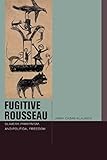Fugitive Rousseau : Slavery, Primitivism, and Political Freedom / Jimmy Casas Klausen.
Material type: TextSeries: Just IdeasPublisher: New York, NY : Fordham University Press, [2014]Copyright date: ©2014Description: 1 online resource (356 p.)Content type:
TextSeries: Just IdeasPublisher: New York, NY : Fordham University Press, [2014]Copyright date: ©2014Description: 1 online resource (356 p.)Content type: - 9780823267477
- 9780823257324
- 320.01 23
- JC179.R9 .K538 2014
- online - DeGruyter
| Item type | Current library | Call number | URL | Status | Notes | Barcode | |
|---|---|---|---|---|---|---|---|
 eBook
eBook
|
Biblioteca "Angelicum" Pont. Univ. S.Tommaso d'Aquino Nuvola online | online - DeGruyter (Browse shelf(Opens below)) | Online access | Not for loan (Accesso limitato) | Accesso per gli utenti autorizzati / Access for authorized users | (dgr)9780823257324 |
Frontmatter -- Contents -- List of Illustrations -- List of Abbreviations -- Acknowledgments -- Introduction -- I Slavery -- 1. Displacements -- 2. . . . and Condensations -- II Freedom? -- 3. Cosmopolitanism -- 4. Nativism -- 5. Fugitive Freedom -- Afterword -- Notes -- Index
restricted access online access with authorization star
http://purl.org/coar/access_right/c_16ec
Critics have claimed that Jean-Jacques Rousseau was a primitivist uncritically preoccupied with “noble savages” and that he remained oblivious to the African slave trade. Fugitive Rousseau presents the emancipatory possibilities of Rousseau’s thought and argues that a fresh, “fugitive” perspective on political freedom is bound up with Rousseau’s treatments of primitivism and slavery.Rather than trace Rousseau’s arguments primarily to the social contract tradition of Hobbes and Locke, Fugitive Rousseau places Rousseau squarely in two imperial contexts: European empire in his contemporary Atlantic world and Roman imperial philosophy. Anyone who aims to understand the implications of Rousseau’s famous sentence “Man is born free, and everywhere he is in chains” or wants to know how Rousseauian arguments can support a radical democratic politics of diversity, discontinuity, and exodus will find Fugitive Rousseau indispensable.
Mode of access: Internet via World Wide Web.
In English.
Description based on online resource; title from PDF title page (publisher's Web site, viewed 03. Jan 2023)


